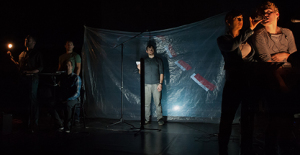New York’s Theater Mitu examines addiction and rehabilitation in ‘Juárez:A Documentary Mythology’ closing Sunday 26 October at LATC’s Encuentro 2014 Festival. Director Rubén Polendo travels back to his hometown along with his troupe and looks back on the drastic changes that have taken place in the last twenty five years. Born into a cultured, artistically inclined family, Polendo’s pre-NAFTA memories are of a city with its share of problems but with a reasonable past and some hope for the future. The controversial trade agreement changed everything. The injection of capital into the veins of the economy gave an ongoing high to a few and brought misery to the rest. Large chunks of land were confiscated from tenant farmers and handed over to corporate interests. Factories overran fields and the poor from other parts of Mexico flocked to get what they could, deplorable conditions notwithstanding. As Juárez grew rapidly, its physical and social infrastructure crumbled under the load, and the criminal element was ready and waiting to take advantage. The drug cartels wreaked their havoc and continue to to do so at a somewhat lower rate. This is being played out all over the world as the Dubais and Shanghais change overnight with little thought given to the human toll.
The team did meticulous research through interviews intending to give voice to the silenced, to tell their stories, and to preserve their memory. This is a recurring theme in theatre from countries facing repression where the art form still matters. We hear the words of great-grandmothers who knew a friendlier border, kidnap victims caught in the crossfire, cynical and clear-eyed journalists, and stalwarts who stick it out despite the carnage in the city they love. And it mostly falls flat.
The small stage is festooned with multiple laptops, work lights, wireless microphones and earpieces, slide projectors, and a screen. Four movements, ‘Context,’ ‘Memory,’ ‘Violence,’ and ‘Change’ are told through a barrage of effects. Four men and two women intone the words of the interviewed in uninflected hipster along with a few bizarre, tuneless songs. Photos and videos, some of stomach-turning cartel savagery, flash by. The accounts of a kidnapped man who survives his abduction and a cartel hit-man telling of his tortures are riveting by exception. It’s less about the citizens of Juárez and more about an artistic process relying heavily on technology which subtracts at every turn. There’s almost no Spanish heard in this story about a Mexican city. When snippets of it do appear, it is an entirely different play. Even without knowing the language, the voices of the affected have undeniable poetry. We’re told that the performers hear the words in their ears (those wireless earpieces) and speak them out for us. So much for the poetry. It gives the unnerving feeling that the structure of the presentation was worked out in advance with the trips just to collect the raw material. The evening closes with a stream of facts about the slow emergence of the city from the depths. Juárez is less violent, more industrial, and a City of the Future implying that this will be repeated elsewhere. We have a lot to learn from those who lived it and here’s to hoping we get that chance someday.
JUÁREZ: A DOCUMENTARY MYTHOLOGY
Conceived and Directed by Rubén Polendo
Encuentro 2014 at the LATC
Final performances: Sunday, 10/26 @ 2:00pm, 7:00pm
https://web.ovationtix.com/trs/pr/938804
